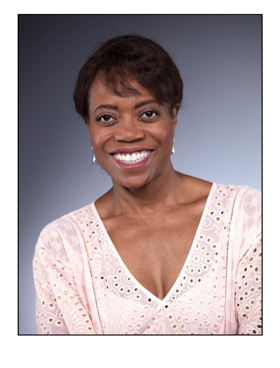Interview: 6 Questions & a Plug with GUESS WHO'S COMING TO DINNER's Regina Marie Williams

Like most Twin Cities theater goers, I've watched Regina Marie Williams play numerous characters in as many plays and musicals across the cities' stages. Her talent speaks for itself. Seeing she's in a show always means you're in for a great performance.
In Guess Who's Coming TO DINNER, by Todd Kreidler and based on the screenplay by William Rose, Williams plays the Drayton family maid, Tillie. Sounds like that would not be a part up to the caliber of actor, right? Maids are often in the background. Williams is a legitimate lead with star power. Not having watched the movie (I obviously have some homework to do), it didn't occur to me this part would be significant. But watching the engaging and delightful production directed by Timothy Bond at the Guthrie recently, I couldn't take my mind off her performance. Of course, she put a lot into this part, and by my eye, she was central to the entire show, standing out in a cast of amazing performers. So I took this opportunity to finally interview Williams and am happy to share the results with you here.
Your role, Matilda "Tillie" Binks, was expanded from the film version, where Isabel Sanford played her. Did the film influence your performance at all? Can you describe some of your thoughts behind your character and her relationship to the Drayton family that drove how you played Tillie?
Creating a life for Tillie outside of the Drayton household was important to me. A life other than being the Drayton's maid. That her ideas be her own. She has "Tilli-isms." Bits of wisdom from her own life experiences that even Mrs. Drayton repeats. She reads the paper and pays attention to business and yet she does not gentrify the way she speaks.
Some of the decisions I made about my problem with the relationship are very different from what is written in the movie. In the movie Tillie berates Dr. Prentice for getting above his station. My Tillie is somewhat irritated with Joanna as well. I am angry that she choses a black man, especially one of such stature. "How dare you take our best for yourself."
Tillie has worked for the Drayton's for 27 years. They have a lot of history. Births and deaths. Not just in the Drayton home but Tillie's mother dies during this time and the support from the Draytons is more than decent. It is loving and supportive. I was thankful for the text that supports this as I wanted some departure from the stereotype of the colored maid that sacrifices her own family for that of her employers.
Near the end of the play Tillie explains that Mr. Drayton's genuine kindness, generosity, and sacrifice at a time when she was most vulnerable is why she is loyal to him.
When thinking about who to interview from the cast, it kept coming back to me that Tillie was always observing the family's actions and conversations, and her presence and opinion played largely into the movement of the story. While things improved, it felt that there were many unanswered questions between these characters as they sat down to dinner. What did you think the outcome was for the two families? Did you feel that Tillie had truly opened her heart to the relationship or just put her original opinion aside to help bring unity?The "Help" often gets to be "the fly on the wall." The unobserved observer. Being in the position to comment or respond makes Tillie's role as maid/house keeper unusual. You are correct that there is no tidy bow. The outcome for the two families is unresolved. The great thing is that they all agree to sit at the table. Tillie's decision to support the couples love and attend the wedding does not mean that issues won't arise in the future that may cause her to wrestle with the idea of the mixed race marriage. Some of those issues are her own and others are societal.
Being the observer is a powerful position to be in. Tillie is able to arrive at her decision to support the couple because she was able to hear all sides, all arguments. And she was proven wrong about who she was convinced the doctor was. How wonderful to have it happen all in one day. For many of us these lessons can take a lifetime.
This version of the story has been described as updated but still set in 1967. Obviously it's relevance is still high in 2018. Did you, the other cast members and directors talk about how to infuse current day thought into this show without completely taking it out of the 60s? What did that mean for you as an African American woman?The primary concern of both sets of parents is that America is not ready for mixed race couples and that we can talk about it in our insular groups but the hearts and homes of America will really never change. They are concerned for the safety of their children. The time we spend telling relevant stories, reading, digesting, and discussing the script before putting it on it's feet is called Table Time. We discuss relevant issues.
The 50th anniversary of Martin Luther King's death was during our rehearsal period. It was a very active month of marches across the country. Stephen Clark was killed in Sacramento (Where Dr. Prentice is from)... We talk about why race doesn't matter, but does matter, and should matter. We talk about how maybe race may not be the issue in a particular situation. Say our child brings home a love interest of the same sex or of a different economic background or ideology and we discover that we are not as liberal as we thought we were. Tillie says "In some ways it's getting better but in others it feels forever the same." Seeing so many mixed race couples at the show front and center indicates that people like to see themselves and their stories onstage and that we still have something to gleen from the story being told.
The moment when Tillie began to sing the song from John's (and her own) childhood was moving and even more so when Greta Oglesby joined you on the tune later in the show. Was that something Playwright Todd Kreidler wrote into the play or was that something added as you worked on this production?
The recording, "Run Home Children, Run Home" provided by our dramaturge, is very old and haunting. The script says Tillie enters humming/singing "Run Home Children" and Mary (Oglesby) hums along. Tim Bond suggested we sing instead of humming. Greta rearranged the lyrics so they would be more interesting to the audiences ear after already hearing it, and together we came up with the harmonies. This is not in the movie and I think it is a profound touch as it is a moment when the women discover they have more in common with each other than being black women. The play has several surprising moments of connection like this one.
You've been in more than a dozen Guthrie shows and appeared all over the Twin Cities area. How did you get your start in acting?I was hired in Los Angeles to play Count von Count with Sesame Street Live/Vee Corporation. We rehearsed in Minnesota and I got my equity card on that show. Eventually moving to Minneapolis. I thought I'd won the lottery!
You work consistently in this area and always seem to have such substantive roles to play (and I'm excited to finally interview you!). What is it like for you as a female actor, who happens to also be African American, and not a millennial (I hate the phrase, "woman of a certain age," probably because I am in that range, too!), getting work in the Twin Cities area right now? Do you feel like there's a lot of room for growth in roles for actors of color, or has multicultural/non-gender specific casting and proactive changes in that realm opened things up for more actors to have more opportunities here?
Wow Kristen. Thanks. And yes, this is a big question!
Earlier this year I finished a four-month run as Deloris Van Cartier in SISTER ACT. I ran across the stage, up and down stairs, in high-heeled purple boots and a gold sequined mini dress. Not sure how long I can do that but have you ever seen Marilyn Maye? I played Nina Simone in NINA SIMONE FOUR WOMEN at Park Square Theater prior to that. Christmas 2016, Corsetted in bright orange and a wig to rival Marie Antoinette, I was Mrs. Fezziwig in Guthrie Theater's A CHRISTMAS CAROL and one of my favorite roles was as Marie in Robert O'Hara's BARBECUE at Mixed Blood Theater. Guess Who's Coming TO DINNER was in the Thrust at the Guthrie, in the McGuire was Danai Guira's FAMILIAR, and across town at Ten Thousand Things the lead role in GOOD PERSON OF SZECHUAN is played by a woman of color.
Those are just a few examples. This variety of work makes it easier to keep one's spirit in tact. We can only hope and work towards it continuing to tip in this direction. Contemporary work is also very important. Not sure what the future holds but the role of maid or prostitute being a constant could be soul crushing. But I have fallen in love with Tillie and wouldn't trade this experience. I have learned that I don't always have to love the characters I am cast for and that people are complicated and that race, gender, age, time period and location are indicators. They dictate behavior. We can try to put on it what we want but we have to be truthful. Honest. I took all that and I came up with Tillie.
I do feel fortunate to work so consistently. There have been lean times but overall I have been able to pay my bills and do some meaningful work. And yes, I am in a different age category now.
I didn't mean that in a bad way -- we're likely similar ages. I think that things in culture today skew young so often. But you list many terrific examples and it certainly does tell a story that I hope continues to rise -- for all the differences we share as people.
What's next (on stage or off) for you?
As a McKnight Theater Artist Fellow at the Playwrights'Center 2017/18 I will perform a piece developed through devising and clowning at the Southern on June 12.
Side note...Playing Tillie was challenging and disturbing for me. First off playing the maid. AGAIN. And I needed to find a different reason for distrusting Dr. Prentice other than him being a Black man. I didn't like that my view of him was the same as the woman who clutches her purse as a black man walks by or that of the watchful store clerk when the person of color walks in the door, etc. But the play also takes place in 1967 and Tillie is a maid. I am not playing myself but a character.
More information: See Guthrie's website for tickets and further information. Guess Who's Coming TO DINNER runs through May 27 at the Guthrie's Wurtele Thrust Stage. Read Karen Bovard's review here. Do yourself a favor and get tickets to this show if you have not yet; it's one of my favorites on a Guthrie stage.
Photo: Regina Marie Williams, courtesy of the Guthrie Theater.
Videos
